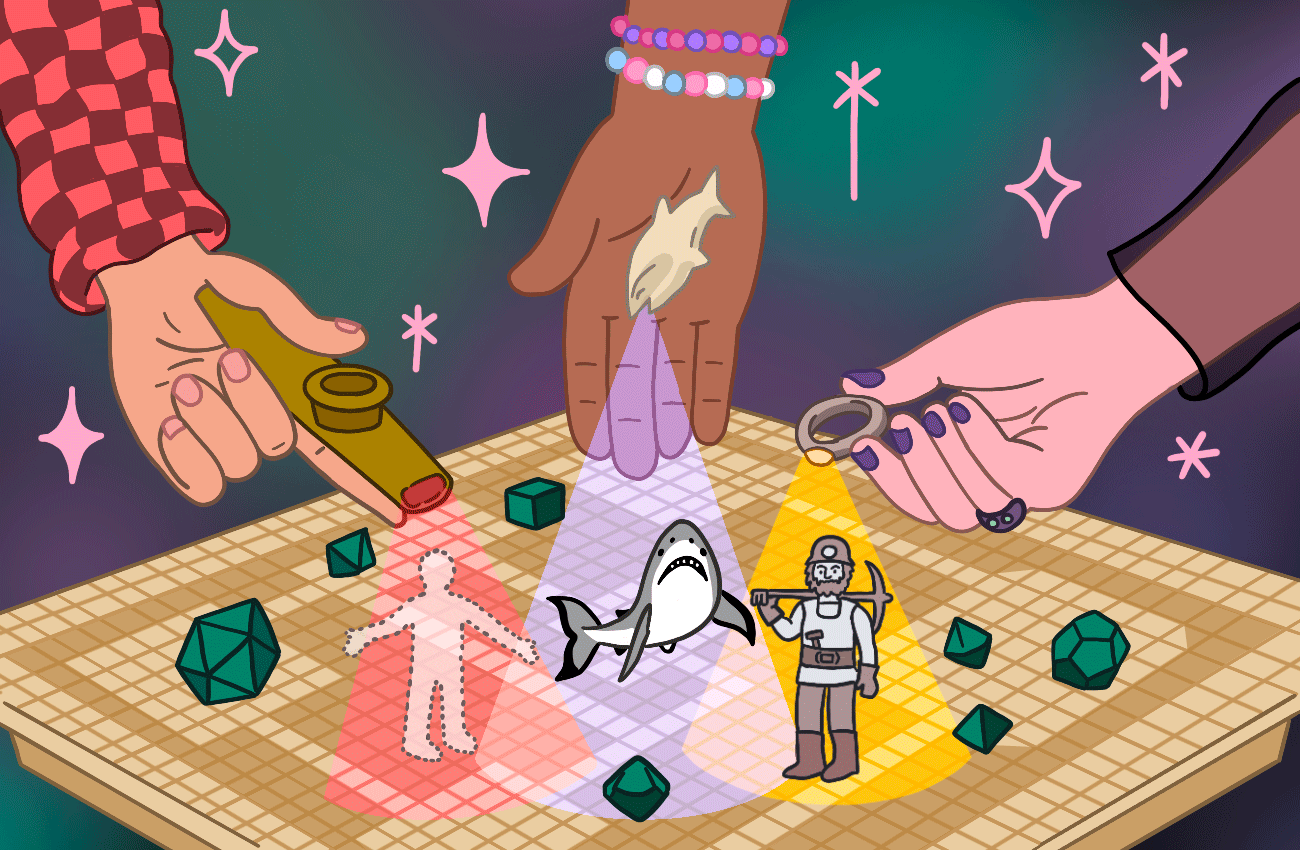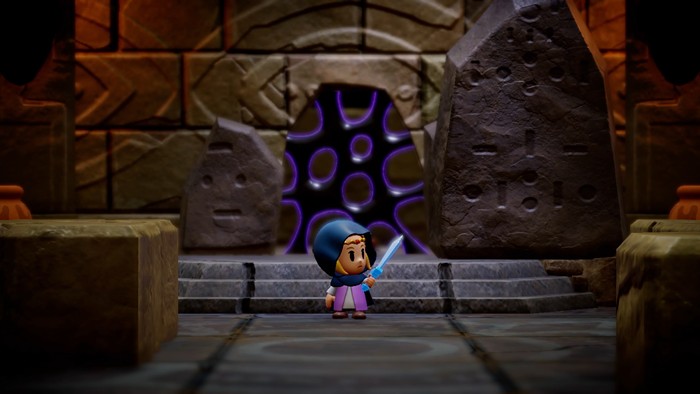Fraggle the rock gnome barbarian, Arrluk the wood elf ranger, and the unnamed tiefling warlock were walking on what should have been a busy street in a bustling market, but found both were suddenly empty.
It was the middle of the day. They should have been darting between rumbling, horse-drawn carriages and hearing shopkeepers’s frenetic haggling from the surrounding stalls. Even these foreigners knew that, in Melora, business was not just like a religion, it was the religion. The locals worshiped Waukeen, goddess of wealth and trade. Her grand acropolis towered over the city’s stout buildings and cast a long shadow in the hot afternoon sun.
The gnome barbarian was standing in that enormous shadow and fanning himself when a tiny hand wriggled into his pocket. In one fluid motion, the gnome whipped around and clutched the narrow wrist of a young human. Under a shag of hair, an eyepatch concealed a severe burn. The human’s mouth hung open.
“Do you mind telling me why you were trying to steal something?” Fraggle asked.
“Well,” the thief hesitated. “You just looked like you had something really good.”
“Solid reasoning,” said Arrluk, fingers tightening around a bow. A panther crouched low between their legs; its eyes darted toward the shapes shifting around the gloomy corners of the market, the thatched-roof stalls, and a fountain in the center of the square. Men with crossbows and bad ideas.
A voice asked the adventurers to roll for initiative. The dice hit the table with a plunk, and the scene dissolved.
Dungeon master Molly Kernan sat at the head of a table at Seattle’s LGBTQ+ Center in Capitol Hill. Three other Dungeons & Dragons players were seated around them in the cozy, dimly-lit room—17-year-old Neo Bracilano (the elf), 14-year-old Miles Sabin (the gnome), and center volunteer, 22-year-old Ryan (the humanoid tiefling). A playing grid was in front of them, along with stacks of plastic containers, a plushy, lime-green 20-sided die, and a handful of painted figurines frozen into battle positions. They clutched crossbows, swords, and powerful books of magic.
Since last May, Kernan has volunteered to organize this monthly D&D game at the LGBTQ+ center, and anyone ages 14-25 can join at any time, regardless of their experience with the game. Unlike some long-standing D&D campaigns, there’s no grand backstory to catch up on. Kernan crafts a new “one-shot” campaign every month, or a story that is intended to last only a few hours. Kernan has set up Western mysteries and pirate adventures. The Stranger witnessed a heist.
After Bracilano, Sabin, and Jessie successfully defended themselves against the thieves, they explained that their ambush had been a test. Their boss, a prominent businessman involved in local city politics who came from humble origins, wanted to hire the players to steal a precious artifact from the high-security temple at the center of town. He believed this artifact, emblazoned with his family crest, would prove his noble lineage and allow him to join the city council.
At heist headquarters, the players were given three enchanted items to aid in their quest: a talisman carved into the shape of a shark that transforms into a living great white when thrown, a kazoo of invisibility, and a ring of “miner” illusion, which projected the ghostly image of a miner.
Kernan’s game started last May, shortly after they began volunteering at the center. She works as a wine clerk but used to teach kindergarten and high school, where she advised the tabletop gaming club. Kernan missed working with young people and had devised this opportunity while talking with a center employee about their interests. D&D came up, as she had played for almost a decade. Her obsession began in 2015.
“A buddy wanted to try it out,” Kernan said. “I expected to do one game and not be that interested, but it super got its claws into me. We played as those characters [every Wednesday] for three or four years.”
In her monthly game at the LGBTQ+ Center, Kernan wants the kids to, above all, have fun. But she also intends the space to be a low-pressure environment where queer kids can make friends, or feel safe enough to try out new names and pronouns without judgment and work out emotional problems through the characters they’ve created.
“A big part is the social aspect,” Kernan said. “Getting to be creative and joyful together, and getting to explore different identities in a safe, fun, and goofy kind of way.”
Fourteen-year-old Sabin, who played as Fraggle the rock gnome, had played D&D before, but never in Kernan’s game. He lives in Kent, and attended at the suggestion of his mother. He told The Stranger he was excited to go again.
“It’s a fantastic time if you’re looking for a sense of escapism and possibly even meeting new friends,” they said.
The number of people attending changes month to month, but Kernan’s worlds are invariably queer. Players encounter queer characters, queer storylines, and queer romances, some of which the players invent themselves. Kernan recalled one session where players were supposed to stop a terrible prince from marrying a vulnerable princess. But one player, who decided the prince was actually a cool, handsome guy, set out to marry him.
The games begin with name and pronoun introductions, and an explanation of the yellow and red light system Kernan operates under. If any player starts interacting with a topic they feel uncomfortable with, they can say “yellow” to slow down or divert the story and “red” to stop the game and check in. (Bracilano, the wood elf, asked if they can say “green” if they’re “really vibing with what’s happening.”)
The game moves along breezily. There is ample room for jokes or questions when players forget the rules. Kernan often breaks in with gentle nudges, too. When Jessie was about to unleash a fireball on the thieves, Kernan reminded them that while spells were limited, warlocks could let loose as many “eldritch blasts” as they wanted. In an email after the game, Kernan said when they had returned to the room after a mid-session break, they’d hovered outside to listen to them form a plan.
“Considering the age range,” Kernan wrote, “and the fact that they had all just met, it was very sweet to hear them equally involved and supportive of each other.”
In the end, the party secured their prize.
They successfully infiltrated the temple by disguising themselves as a noble and two escorts in need of a salve for their panther’s magical illness. After traversing its passages, and oscillating between wild success and abject failure, they found the vault. Inscribed on the door was a riddle: “The cost of gold is iron; pay the price and enter” (the answer was blood). Behind the door, they discovered a starving manticore—an evil creature with a humanoid head, body of a lion, and wings of a dragon—and earned its friendship by throwing the great white shark charm straight into its gullet.
Kernan said it was a solution they never could have expected.
Seattle's LGBTQ+ Center is located at 400 E Pine St #100. The next drop-in game is Saturday, July 20, at noon. For more information about future games, visit the Seattle LGBTQ+ Center’s events calendar.

















